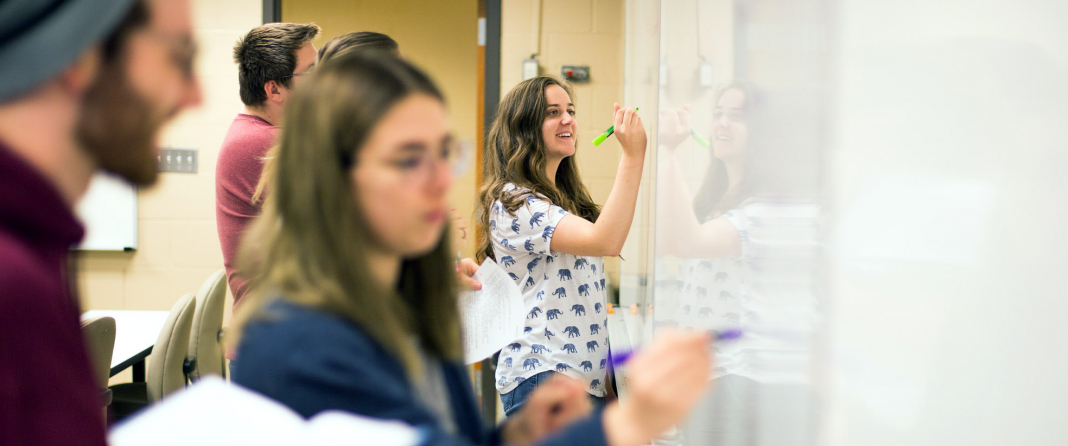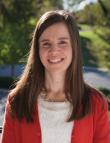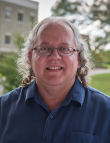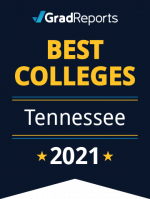Overview
Combine your love of mathematics with your passion for future generations with Trevecca’s Mathematics Education degree.
Our math department has partnered with Trevecca’s School of Education to provide you with a degree balanced with the study of mathematics and education. With this collaboration, you’ll be well-prepared for a teaching career in grades six through twelve.
Upon graduation, students within the mathematics education program will be ready to start teaching.
Our small class sizes ensure that you’ll receive thorough attention, advising and instruction from professors who not only hold the highest degrees in their fields, but who will work with you one-on-one on different projects, mentorships and research. Earning your degree at Trevecca means you’ll receive a quality education without sacrificing your beliefs or values, our strong Christian community ensures that you’ll have support each step of the way and opportunity to grow your perspective and worldview.
At Trevecca, we encourage our mathematics students to participate in the national and international math community; our students have opportunities to apply for internships, conferences and research projects around the world. Many of our students have attended the NSF Summer Research Experiences for Undergraduates (REU) and the Joint Mathematics Meeting, the largest annual mathematics conference in the world, held in cities such as San Diego and Boston.
Our graduates are well-prepared for a growing job market. With STEM jobs projected to grow by 9 million between now and 2024, Trevecca mathematics graduates face a bright future. The graduates of this program have a 100% pass rate on the Math Praxis, a test that is required for teaching licensure in Tennessee.
STEM teachers are in high demand, so if you’re looking for the opportunity to combine your love of math with teaching Trevecca’s mathematics education program might be right for you.

Faculty
News
Core Classes
Perspectives in Mathematics
MAT 1400
An introduction to mathematical thought for students, especially freshmen, who are interested in a mathematics major or minor, or for any student interested in learning about some important ideas and uses of mathematics. Several contemporary mathematical topics will be studied, such as recently solved problems, orders of infinity, Fermat's last theorem, Tangles and knot theory, cryptography, the fourth dimension, the four-color theorem, topology, or fractals and chaos. Graded S, U.
Course Hours: 1
Calculus II
MAT 1520
A study of Cartesian and polar coordinates, parametric equations, vectors and vector-valued functions in 2 and 3 dimensions, limits, differentiation of functions with applications, integration of functions with applications, Taylor polynomials, and series. It is strongly recommended that students take PHY 2110 and PHY 2120 concurrently with MAT 1510 and MAT 1520, respectively.
Course Hours: 4
Introduction to Abstract Mathematics
MAT 2600
Study of basic ideas and methods of mathematics including sets, logic, proof techniques, relations, functions, mathematical induction, and modular arithmetic. Prerequisite or corequisite: MAT 1520.
Course Hours: 3
Theory of Probability and Mathematical Statistics
MAT 3000
Probability of sample spaces, random variables, discrete and continuous probability distributions. Analysis of the principles of descriptive and inferential statistics.
Course Hours: 3
Discrete Methods
MAT 3010
Discrete mathematical ideas including graph theory, counting techniques, recurrence relations, and methods of solving applied problems.
Course Hours: 3
Linear and Matrix Algebra
MAT 3090
Linear equations, vector operations, matrices, determinants, linear transformations, eigenvalues and eigenvectors, singular values and singular vectors, canonical forms, polynomial functions of matrices, vector spaces, and related topics.
Course Hours: 3
Introduction to Real Analysis
MAT 4030
Introduces the scientist to Bioinformatics, which uses computer databases to store, retrieve and assist in understanding biological information. Genome-scale sequencing projects have led to an explosion of genetic sequences available for automated analysis. These gene sequences are the codes, which direct the production of proteins that in turn regulate all life processes. The student will be shown how these sequences can lead to a much fuller understanding of many biological processes allowing pharmaceutical and biotechnology companies to determine for example new drug targets or to predict if particular drugs are applicable to all patients. Students will be introduced to the basic concepts behind Bioinformatics and Computational Biology tools. Hands-on sessions will familiarize students with the details and use of the most commonly used online tools and resources.
Course Hours: 3
Modern Algebra
MAT 4060
Sets, groups, rings, and fields. Logical rigorous proofs and analysis are emphasized.
Course Hours: 3
Becoming a Teacher
EDU 1020
Provides observation and participation in a public school. Field study is completed in the following areas: classroom observation, classroom material preparation, and classroom interactions to enhance the knowledge, skills, and professional dispositions required of educators. The requirements for entering the Teacher Education Program are part of the course. Graded S-U.
Course Hours: 1
Foundations of Education
EDU 1500
Surveys the historical, social, philosophical, and psychological foundations of the American school system with emphasis on an introduction to the teaching profession. Designed to be the first course taken in the teacher education program. Taken in conjunction with EDU 1020.
Course Hours: 2
Secondary Curriculum and Instruction
EDU 2300
Focuses on effective instructional methods and curriculum models for 7-12 teachers. Common Core Standards and best practices in creating enthusiastic learning environments and writing learning plans are explored. Using data to inform instruction is addressed as part of the planning component. A 20 hour field experience is required.
Course Hours: 3
Effective Classroom Environments
EDU 2556
Focuses on the major traditional and current behavior management theorists and strategies. Prepares the candidate to use effective strategies for developing a safe but invigorating classroom climate. The creation of a position plan paper and its implementation in a classroom with subsequent re-evaluation of the plan and the candidate's implementation strategies are included within this course.
Course Hours: 2
Educational Tests and Measurements
EDU 3410
Examines test construction and application of evaluation principles related to K-12. Emphasis on reading, interpreting, and using data from a variety of assessments including standardized and teacher-made achievement tests. Common Core Standards will be studied in relationship to both formative and summative assessment as instructional tools.
Course Hours: 2
Overview
Combine your love of mathematics with your passion for future generations with Trevecca’s Mathematics Education degree.
Our math department has partnered with Trevecca’s School of Education to provide you with a degree balanced with the study of mathematics and education. With this collaboration, you’ll be well-prepared for a teaching career in grades six through twelve.
Upon graduation, students within the mathematics education program will be ready to start teaching.
Our small class sizes ensure that you’ll receive thorough attention, advising and instruction from professors who not only hold the highest degrees in their fields, but who will work with you one-on-one on different projects, mentorships and research. Earning your degree at Trevecca means you’ll receive a quality education without sacrificing your beliefs or values, our strong Christian community ensures that you’ll have support each step of the way and opportunity to grow your perspective and worldview.
At Trevecca, we encourage our mathematics students to participate in the national and international math community; our students have opportunities to apply for internships, conferences and research projects around the world. Many of our students have attended the NSF Summer Research Experiences for Undergraduates (REU) and the Joint Mathematics Meeting, the largest annual mathematics conference in the world, held in cities such as San Diego and Boston.
Our graduates are well-prepared for a growing job market. With STEM jobs projected to grow by 9 million between now and 2024, Trevecca mathematics graduates face a bright future. The graduates of this program have a 100% pass rate on the Math Praxis, a test that is required for teaching licensure in Tennessee.
STEM teachers are in high demand, so if you’re looking for the opportunity to combine your love of math with teaching Trevecca’s mathematics education program might be right for you.




